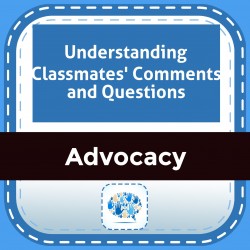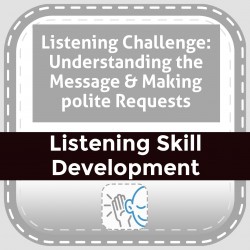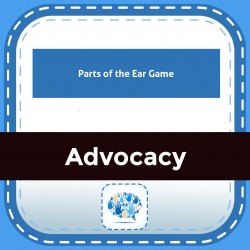Ability Levels
Categories
Resource Types
Age/Grade Range
CCSS
Anchor Standard
Speaking & Listening
Language
Reading
Understanding Classmates' Comments and Questions
$ 195
Use these discussion questions and fillable planning guide to help students problem solve and learn to advocate for themselves when they do not have full access to a spoken message.
Advocacy - Steps to SA Success Goal 6- Self-Management
$ 3
Success in advocacy requires forethought and planning. The knowledge of problem-solving skills combined with an understanding of emotion-based behavior (Goal 4) are used in decision making and self-ma
...
nagement. Decisions are different from problems in that there is personal interest in the outcome. Students will understand the difference between qualitative and quantitative information and how it relates to decision-making.
Let's Talk! Communication Breakdown & Repair
$ 395
A wordless book to facilitate teaching and discussion of Communication and Communication Breakdown, including vocabulary: speaker, listener, message, environment, repair. Students identify specific la
...
nguage and strategies for repairing breakdown caused by characteristics of the environment, the speaker and the message.
Advocacy - Supplement to Steps to Success BUNDLE
$ 1095
This bundle of teacher information, worksheets, and activities include a range of advocacy topics from college preparation, to living indpendently. Students will acquire new vocabulary, use critical
...
thinking skills to solve problems, opportunities for self-discovery and discussion, and above all learn the who, what, when, how, and why of self-advocacy. Though some activities can be modified for upper elementary, most activities are for intermediate to advanced learners. 41 pages. Collected IDs in the BUNDLE: S0XHLU0740, S0XHLU0741, S0XHLU0742, S0XADV0743, S0XSOC0744, S0XSM0745, S0XADV0748.
Listening Challenge: Understanding the Message & Making polite Requests
$ 195
Students discuss situations that create listening challenges, discuss strategies and polite requests that can address the problem. An all-purpose game board, worksheets and teacher script creating com
...
munication breakdown are provided to facilitate practice.
Advocacy - Steps to SA Success Goal Review
$ 5
Once specific skills have been taught and practiced with support, topic centered activities are a good way to review previouSZy taught steps and demonstrate mastery over time and in different situatio
...
ns. Advocacy instruction is not a onetime ‘teach and it’s done’ type of lesson. Incorporating advocacy instruction within daily routine and through topics of interest will promote retention and used of learned skills.
Student Friendly Adapted SEAM
$ 7
The ADAPTED SEAM uses student-friendly language that activates self-reflective skills, encourages student ownership, and provides an interactive/conversation starter when done with the student. Some s
...
tudents experience an "ah-ha moment" about their responsibility the first time they complete the chart.
Ways To Use This:Discussion tool while completing the data form with your student. Self-reflection tool for older students while providing data for you.Assessment tool for determining self-advocacy present levels. (sample write-up included)Baseline data for your measurable IEP goal. (sample goal included)Students To Use This With?A student who is missing many of these skills at their levelsA student who is NEW to hearing devices regardless of age. An older student needing frequent reminders of these skills can benefit from revisiting the form periodically to track their progress.Why Use this?Editable PDF or Printable (2 versions)Timely benchmarks for progress reportingEasily Attach/Upload to IEP SystemsSample Assessment/Present Level Write-Up provided Sample IEP Goal & Completed Student Example providedWhat's Included in this Adapted SEAM Product?Overview of All Adapted Levels At a Glance (1 page) Directions and Ways To UseEditable PDFs - compact, single-page view. (7 forms/levels: Pre-K, K, 1st-2nd, 3rd, 4th, 5th, MS/HS)Printable Forms - expanded onto 2 sides for reading and writing ease. (7 forms/levels: Pre-K, K, 1st-2nd, 3rd, 4th, 5th, MS/HS)Student Data Example Sample Assessment/Present Levels Write-UpSample IEP goalSample - Real Student Form Completed over an IEP year.
Parts of the Ear Game
$ 5
This is a fun digital learning activity for a student to review the 3 parts of the ear. The learner identifies the function of each part, what is in each part and uses a diagram to identify parts of t
...
he ear.There are very few digital learning activities available today. Advocacy practice for students with hearing loss includes learning about hearing. As students begin to learn how they ear, identifying the 3 parts of the ear is a first step. They need lots of practice labeling different parts of the ear and identifying how they help with hearing. Learning Objective:1. The student will be able to identify functions of the 3 parts of the ear. 2. Given a diagram, the student will label the part of the ear.
Advocacy - Steps to SA Success Goal 2- Use of Technology
$ 3
Students learn vocabulary associated with hearing technology and how to take care of it. Use this fillable worksheet with students to problem-solve what is good/bad for devices.
 Your browser is out of date. For best experience switch to latest updated Browser.
Your browser is out of date. For best experience switch to latest updated Browser.
 Get Chrome
Get Chrome Get Edge
Get Edge Get Firefox
Get Firefox









